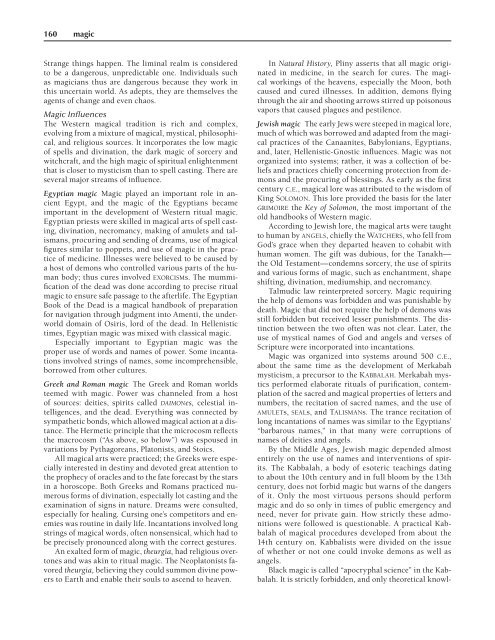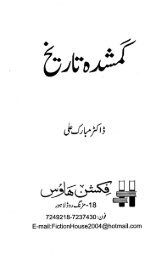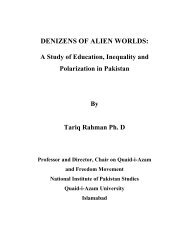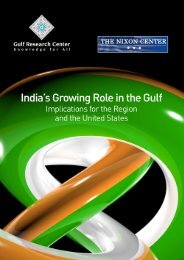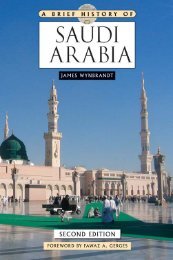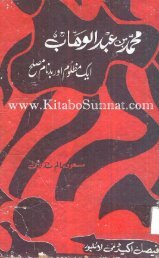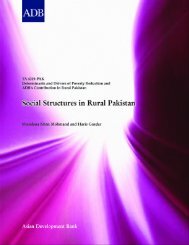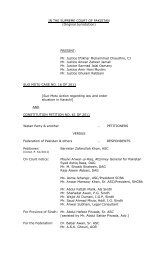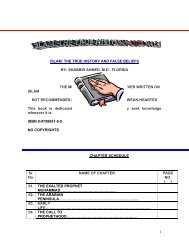The Encyclopedia Of Demons And Demonology
The Encyclopedia Of Demons And Demonology
The Encyclopedia Of Demons And Demonology
You also want an ePaper? Increase the reach of your titles
YUMPU automatically turns print PDFs into web optimized ePapers that Google loves.
160 magic<br />
Strange things happen. <strong>The</strong> liminal realm is considered<br />
to be a dangerous, unpredictable one. Individuals such<br />
as magicians thus are dangerous because they work in<br />
this uncertain world. As adepts, they are themselves the<br />
agents of change and even chaos.<br />
Magic Influences<br />
<strong>The</strong> Western magical tradition is rich and complex,<br />
evolving from a mixture of magical, mystical, philosophical,<br />
and religious sources. It incorporates the low magic<br />
of spells and divination, the dark magic of sorcery and<br />
witchcraft, and the high magic of spiritual enlightenment<br />
that is closer to mysticism than to spell casting. <strong>The</strong>re are<br />
several major streams of influence.<br />
Egyptian magic Magic played an important role in ancient<br />
Egypt, and the magic of the Egyptians became<br />
important in the development of Western ritual magic.<br />
Egyptian priests were skilled in magical arts of spell casting,<br />
divination, necromancy, making of amulets and talismans,<br />
procuring and sending of dreams, use of magical<br />
figures similar to poppets, and use of magic in the practice<br />
of medicine. Illnesses were believed to be caused by<br />
a host of demons who controlled various parts of the human<br />
body; thus cures involved EXORCISMs. <strong>The</strong> mummification<br />
of the dead was done according to precise ritual<br />
magic to ensure safe passage to the afterlife. <strong>The</strong> Egyptian<br />
Book of the Dead is a magical handbook of preparation<br />
for navigation through judgment into Amenti, the underworld<br />
domain of Osiris, lord of the dead. In Hellenistic<br />
times, Egyptian magic was mixed with classical magic.<br />
Especially important to Egyptian magic was the<br />
proper use of words and names of power. Some incantations<br />
involved strings of names, some incomprehensible,<br />
borrowed from other cultures.<br />
Greek and Roman magic <strong>The</strong> Greek and Roman worlds<br />
teemed with magic. Power was channeled from a host<br />
of sources: deities, spirits called DAIMONes, celestial intelligences,<br />
and the dead. Everything was connected by<br />
sympathetic bonds, which allowed magical action at a distance.<br />
<strong>The</strong> Hermetic principle that the microcosm reflects<br />
the macrocosm (“As above, so below”) was espoused in<br />
variations by Pythagoreans, Platonists, and Stoics.<br />
All magical arts were practiced; the Greeks were especially<br />
interested in destiny and devoted great attention to<br />
the prophecy of oracles and to the fate forecast by the stars<br />
in a horoscope. Both Greeks and Romans practiced numerous<br />
forms of divination, especially lot casting and the<br />
examination of signs in nature. Dreams were consulted,<br />
especially for healing. Cursing one’s competitors and enemies<br />
was routine in daily life. Incantations involved long<br />
strings of magical words, often nonsensical, which had to<br />
be precisely pronounced along with the correct gestures.<br />
An exalted form of magic, theurgia, had religious overtones<br />
and was akin to ritual magic. <strong>The</strong> Neoplatonists favored<br />
theurgia, believing they could summon divine powers<br />
to Earth and enable their souls to ascend to heaven.<br />
In Natural History, Pliny asserts that all magic originated<br />
in medicine, in the search for cures. <strong>The</strong> magical<br />
workings of the heavens, especially the Moon, both<br />
caused and cured illnesses. In addition, demons flying<br />
through the air and shooting arrows stirred up poisonous<br />
vapors that caused plagues and pestilence.<br />
Jewish magic <strong>The</strong> early Jews were steeped in magical lore,<br />
much of which was borrowed and adapted from the magical<br />
practices of the Canaanites, Babylonians, Egyptians,<br />
and, later, Hellenistic-Gnostic influences. Magic was not<br />
organized into systems; rather, it was a collection of beliefs<br />
and practices chiefly concerning protection from demons<br />
and the procuring of blessings. As early as the first<br />
century C.E., magical lore was attributed to the wisdom of<br />
King SOLOMON. This lore provided the basis for the later<br />
GRIMOIRE the Key of Solomon, the most important of the<br />
old handbooks of Western magic.<br />
According to Jewish lore, the magical arts were taught<br />
to human by ANGELS, chiefly the WATCHERS, who fell from<br />
God’s grace when they departed heaven to cohabit with<br />
human women. <strong>The</strong> gift was dubious, for the Tanakh—<br />
the Old Testament—condemns sorcery, the use of spirits<br />
and various forms of magic, such as enchantment, shape<br />
shifting, divination, mediumship, and necromancy.<br />
Talmudic law reinterpreted sorcery. Magic requiring<br />
the help of demons was forbidden and was punishable by<br />
death. Magic that did not require the help of demons was<br />
still forbidden but received lesser punishments. <strong>The</strong> distinction<br />
between the two often was not clear. Later, the<br />
use of mystical names of God and angels and verses of<br />
Scripture were incorporated into incantations.<br />
Magic was organized into systems around 500 C.E.,<br />
about the same time as the development of Merkabah<br />
mysticism, a precursor to the KABBALAH. Merkabah mystics<br />
performed elaborate rituals of purification, contemplation<br />
of the sacred and magical properties of letters and<br />
numbers, the recitation of sacred names, and the use of<br />
AMULETs, SEALs, and TALISMANs. <strong>The</strong> trance recitation of<br />
long incantations of names was similar to the Egyptians’<br />
“barbarous names,” in that many were corruptions of<br />
names of deities and angels.<br />
By the Middle Ages, Jewish magic depended almost<br />
entirely on the use of names and interventions of spirits.<br />
<strong>The</strong> Kabbalah, a body of esoteric teachings dating<br />
to about the 10th century and in full bloom by the 13th<br />
century, does not forbid magic but warns of the dangers<br />
of it. Only the most virtuous persons should perform<br />
magic and do so only in times of public emergency and<br />
need, never for private gain. How strictly these admonitions<br />
were followed is questionable. A practical Kabbalah<br />
of magical procedures developed from about the<br />
14th century on. Kabbalists were divided on the issue<br />
of whether or not one could invoke demons as well as<br />
angels.<br />
Black magic is called “apocryphal science” in the Kabbalah.<br />
It is strictly forbidden, and only theoretical knowl-


